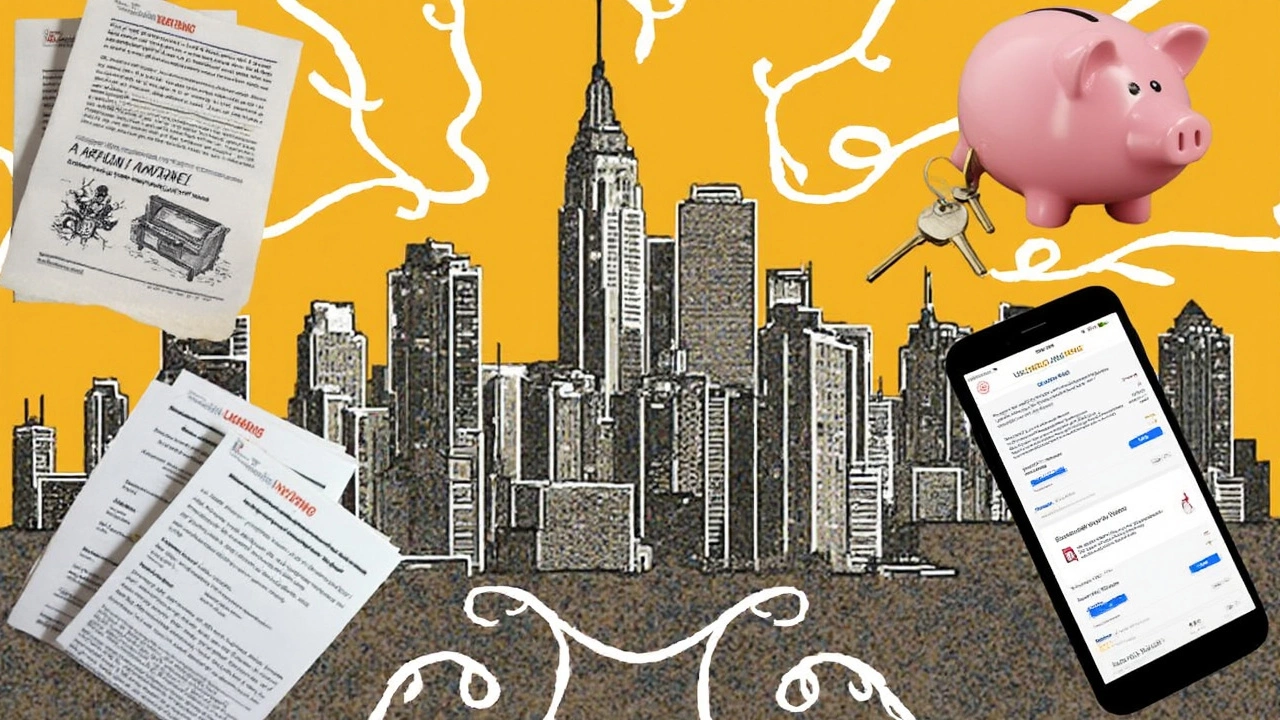Ever try to rent an apartment in NYC? Feels a bit like trying to solve a Rubik's cube blindfolded, right? And oh, the question of credit scores! You might be wondering if you even need one to get a roof over your head. Short answer: usually yes, but don't throw in the towel yet. It's not the only thing that matters.
Let's break it down: landlords often peek at your credit score like it’s some crystal ball predicting your future behavior. A decent score suggests you're responsible with your money. But here's the kicker – not all landlords are stuck on that number. Some are open to other ways to show you're a safe bet.
Imagine you can’t boast the perfect credit score. Don’t sweat it just yet. Alternatives exist, and if you play your cards right, you might just show you’re reliable without flashing a three-digit number. Dive into the ins and outs of what landlords really care about, and you might find yourself scoring that apartment in the city—even if your credit isn’t sparkling.
- Understanding the Role of Credit Scores
- Alternatives to Traditional Credit Checks
- Building Trust with Potential Landlords
- Tips for Improving Your Rental Application
- Know Your Rights as a Renter
Understanding the Role of Credit Scores
So, what's the big deal with this credit score when it comes to snagging an apartment in NYC? Think of it as your financial report card. It’s a way for landlords to size you up without actually knowing you.
Typically, a credit score is a number between 300 and 850. Lenders check this to see how often you pay bills on time, how much debt you have, and how long your credit history is. In NYC, landlords aren’t keen on renting their expensive spaces without knowing if you can handle payments steadily.
Here’s where it gets interesting—many landlords look for a score of 700 or above. It's kind of like the golden ticket that says you're trustworthy. But let’s not get too dramatic; if your score is lower, it doesn’t mean you’re automatically out in the cold.
Landlords tend to be risk-averse, especially in a pricey market like NYC. They see a good credit score as lower risk. But they also know that life happens. That’s why some consider other factors like stable employment and income when reviewing applications.
And surprise, not all landlords use your credit score as a dealbreaker. They know numbers don’t capture the whole picture of your ability to pay rent. Some landlords might only check for bankruptcies or large debts instead of the actual score.
In case you're curious about how credit scores break down:
- Payment history: 35%
- Amounts owed: 30%
- Length of credit history: 15%
- New credit: 10%
- Credit mix: 10%
This mix is what they’re looking at when they talk about your creditworthiness.
If you’re tossing and turning at night worrying about your score, remember, there are ways to boost it over time. Paying bills on time, reducing debt, and regular credit monitoring can help raise that number. But more on that later!
Alternatives to Traditional Credit Checks
So, you’re trying to rent an apartment in NYC but your credit score is giving you the evil eye. Don't panic just yet! There are some clever workarounds that might open doors, even if your credit score isn’t picture-perfect.
First up, consider offering a larger security deposit. This might ease a landlord's mind knowing you've got something extra on the line. It shows you’re serious and ready to back it up with cold hard cash.
Another option is snagging a co-signer. This could be a family member or a friend with a stellar credit score. Essentially, they promise to cover rent if you can’t. It’s about sharing responsibility—a little team effort can go a long way.
How about getting a reference letter? A glowing recommendation from a previous landlord or employer can be golden. It’s like showing off your best report card.
According to the New York City Housing Authority, "A compelling letter of reference can sometimes sway landlords more than numbers."
No luck with letters? Showing proof of stable income might make landlords look past your credit hiccups. Gather pay stubs, tax returns, or even a letter from your employer. Seeing consistent earnings might ease a landlord's doubts.
If all else fails, look into renting from individual homeowners instead of big management companies. They might be more flexible and willing to discuss alternatives.
- Larger security deposit
- Co-signer with good credit
- Reference letters
- Proof of stable income
- Individual landlords
These strategies don’t just help you rent; they build landlord trust. And let's face it, in NYC, a little trust can make all the difference.

Building Trust with Potential Landlords
Trying to make a landlord trust you without that shiny credit score? It's totally doable. It all starts with showing you’re reliable and responsible in other ways. Let’s break down some practical steps to build that trust without relying solely on your credit score.
First off, get those references lined up. Landlords love a good word from past landlords or employers. It’s like getting a glowing review on your favorite gadget. If you've always paid your rent on time, make sure your previous landlord can vouch for you. That's gold in the renting world.
Next, consider offering a larger security deposit. This can be a game-changer. Landlords might feel more comfortable taking a chance on you if they have a little extra financial cushion.
You can also show proof of stable income. Regular pay stubs or a letter from your employer saying you’re secure at your job can be very reassuring. It tells the landlord you’ve got the funds to cover the rent each month.
Being upfront about your situation doesn’t hurt either. Chatting with the landlord and explaining why your credit score isn’t the best lets them know you’re self-aware and willing to address concerns. It’s like laying all your cards on the table; honesty can go a long way.
In some cases, you might want to consider getting a co-signer. If your credit isn’t the best, a trustworthy co-signer with a good credit history can help bridge the gap. They basically promise to cover the rent if you can’t, which lessens the risk for the landlord.
Remember, it’s about showing potential landlords that you’re not a risky tenant, even if your credit score says otherwise. These steps can help you do just that, making it much easier to find a place to call home in NYC.
Tips for Improving Your Rental Application
Getting your rental application to the top of the landlord's pile in a place as competitive as NYC isn't all glitter and glam. You’ve got to nail down some key elements. Want to make sure you’re a standout applicant? Here are some steps you can take:
- Boost Your Credit Score: If you've got time, start by working on that credit score. Pay bills on time, tackle any outstanding debts, and avoid opening too many credit accounts at once. Even a slight bump can make a difference.
- Stable Income: Landlords love seeing a steady paycheck. Typically, they’re looking for an income that's at least 40 times the monthly rent. If you've got it, flaunt it—this will show them you can comfortably afford the place.
- Letter of Recommendation: Ask previous landlords for a recommendation letter. Anything that speaks to your responsibility and prompt rent payment history is golden. It helps the new landlord trust you’re the real deal.
- Offer a Larger Deposit: Sometimes putting a little extra cash on the table—like a larger security deposit—can help ease a landlord's worries about your credit score.
- Consider a Co-signer: If your credit or income doesn’t quite make the cut, a co-signer could save the day. This person agrees to cover the rent if you can’t, offering your landlord extra security.
Oh, and here's a fun fact: nearly 30% of renters use a co-signer to rent in high-demand areas like NYC. It’s more common than you might think.
So, get cracking on these tips to smoothen the path to your future pad. And remember, while the perfect credit score helps, it’s not the be-all and end-all in renting an apartment in the city that never sleeps.

Know Your Rights as a Renter
Renting in NYC can feel like a labyrinth, but knowing your rights is the GPS that keeps you on track. First off, you have the right to a habitable apartment. That means your landlord must provide things like heat, hot water, and maintenance for essential services. If they don't, you've got every right to kick up a fuss and demand those basics get sorted pronto.
You're also protected from unfair rent hikes. If your place is rent-stabilized, which, lucky you if it is, your landlord can't just jack up your rent all willy-nilly. There's usually a cap on how much they can increase each year. Good to know, right?
And ever felt like your walls have ears? Well, the law is on your side here too. Landlords need to give you a heads-up, usually 24 hours, before popping in for a visit. It's not just a courtesy—it's your right for privacy.
- Ensure your security deposit is handled correctly. It should be returned, with interest if applicable, when your lease wraps up, assuming you leave the place in good shape.
- If repairs are dragging on too long, you've got the right to withhold rent until they get fixed in some cases.
- Discrimination? Nope, not allowed. It's illegal for landlords to discriminate based on race, religion, gender, and more.
Need some stats to back up your confidence? Check out the details below:
| Right | Percentage Awareness |
|---|---|
| Right to Habitable Living | 85% |
| Protection from Rent Hikes | 70% |
| Privacy and Entry Notifications | 77% |
So, when renting an apartment in this buzzing city that never sleeps, keep your rights close to heart. Stand your ground, speak up if things aren't right, and remember you're not just a tenant, you're an equal player in this game. The more you know, the less likely anyone can pull the wool over your eyes. Stay sharp, and you'll be navigating renting waters with ease!
